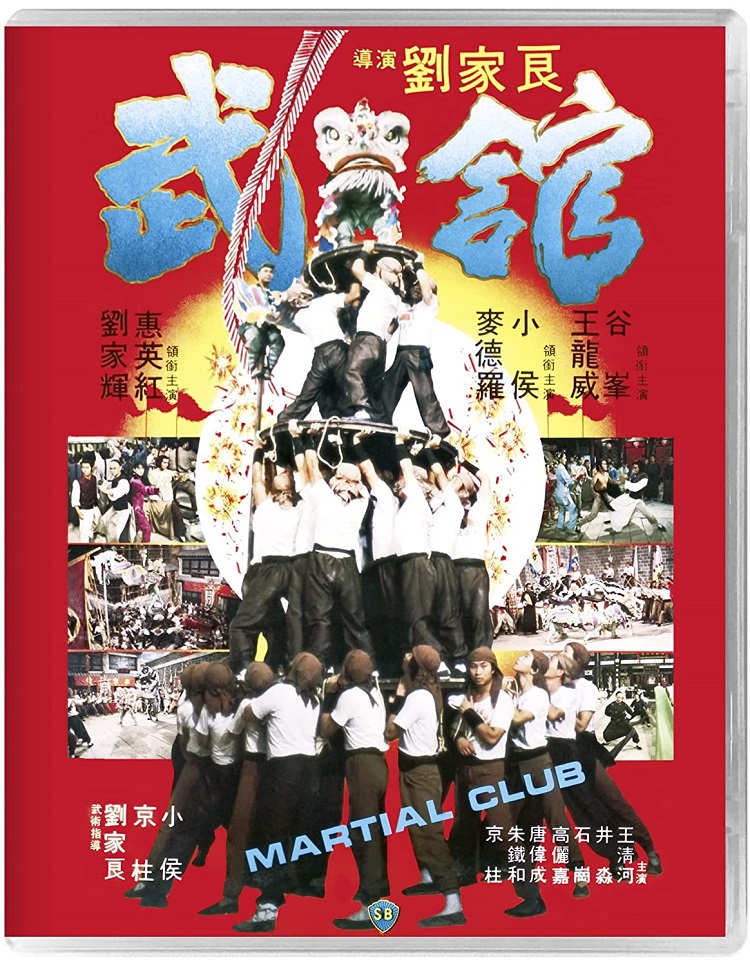
The more Shaw Brothers kung fu movies I watch the more I get into their grooves and understand their tropes. The more I also dig when they subvert and play with the same. Martial Club (1981) has a lot of fun playing with the tropes of the genre. It begins with a lion dance that plays over the opening credits. This is similar to the standard Shaw Brothers opening which usually involves some kind of demonstration of the types of action we’ll see throughout the film. This one differs in that it also features some narration in which we are told in detail the rules of lion dance, or more specifically how not to behave when another club’s lion enters your scene: no eye fluttering, don’t lift your leg, and under no circumstances should you sniff the other lion’s butt.
The plot is pretty standard stuff, yet it too gets a tweak. Two rival clubs seek to outdo and destroy each other. Yet in this film, there is no bloodshed and no one dies. The film is more concerned with teaching moral lessons about honor and integrity than it is serving up an action-packed, blood-soaked, typical Shaw Brothers film. And yet there are some really terrifically choreographed fight scenes.
Let’s talk about those for a moment. The film begins properly with a brilliant lion dance. Several men hold up a round table top. Upon this table are more men holding yet another, but smaller wooden top, on top of which is yet another table, and then a man inside the lion’s head. It is like a tiered wedding cake but made of humans instead of eggs, flour, and sugar. At the end of their dance, another club enters the scene dancing in their lion costume. They break all the aforementioned rules including some aggressive butt-sniffing. A brawl ensues and creates the rivalry that propels the rest of the film.
Later, one of the clubs ambushes the other inside a theater. Choreographed mayhem ensues. It is a chaotic, spectacular battle that lasts a very long time. Lastly, the final battle happens in an increasingly narrow alleyway where two men use nearly every kung fu style in existence. These three sequences along Martial Club is well worth watching.
Gordon Liu and Mai Te-Lo play friends who are also on opposite ends of the rival clubs. They want to determine who is the better fighter but are afraid an actual fight between them might ruin their friendship. They decide to fight two strong men and see who can knock their opponent down in the least number of hits. Both secretly pay off their opponents to get them to fall on the sixth hit.
It makes for some funny sequences, yet it is also the film’s way of allowing us to watch these characters go from goofy kids who care more about the appearance of being a good fighter than actually being stand-up warriors. Later, they will learn lessons in humility.
One of the clubs hires a northerner (Johnny Wang Lung Wei) who thinks he is there to promote the merging of northern and southern styles of kung fu but is unknowingly there to give one gang an edge over the other. This too will serve as a lesson in the film. Kara Hui plays Mai Te-Lo’s always-ready-to-fight sister, but the film mostly sidelines her.
The plot isn’t particularly interesting and the constant moralizing is more than a little strange to this American. I wonder how it played to Chinese audiences. I did find it interesting that one of the major fights ended with the loser basically telling the guy who just beat him “good job” and then he walks away. That’s certainly different than the usual blood-filled death scene.
What makes Martial Club well worth watching are those three action sequences. They are so well choreographed and so different from each other, making each one essential viewing.
88 Films presents Martial Club with a new HD transfer from the original negative. It contains both Mandarin and English language tracks with a new English subtitle translation for the Mandarin audio. Extras include an audio commentary with Asian cinema expert Frank Djeng and actor / martial artist Michael Worth plus an additional, separate commentary with just Djeng. Also included are numerous interviews with cast and crew and some trailers.